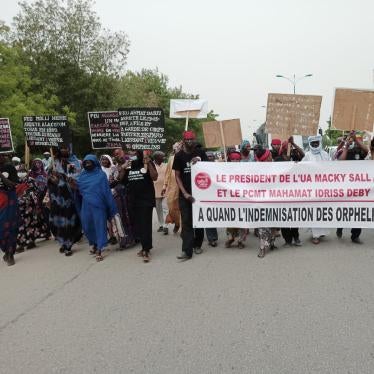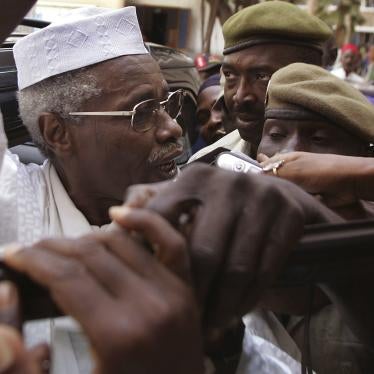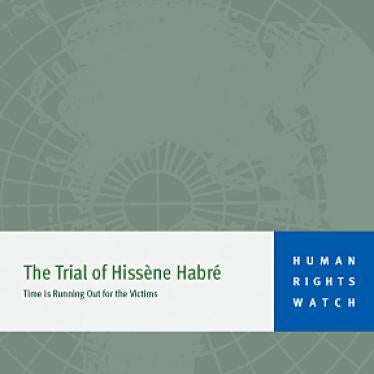(Dakar) – The victims of the late Chadian President Hissène Habré have yet to receive court-ordered reparations, seven years after his landmark conviction in Senegal in 2016, seven Chadian and international organizations said today. Just days before the anniversary, two more victims’ leaders passed away.
On May 30, 2016, an African Union (AU)-backed Senegalese court in Dakar convicted Habré of crimes against humanity, war crimes, and torture, including sexual violence and rape, and sentenced him to life in prison. Habré died in prison in August 2021. In a separate trial in Chad, a court on March 25, 2015, had convicted 20 Habré-era security agents on murder and torture charges. Both courts ordered millions of dollars in victim compensation. The AU and the government of Chad should fulfill their obligations to the victims under these court orders, the organizations said.
“Habré’s victims are heroes who fought relentlessly for 25 years to bring him and his henchmen to justice, and were awarded millions of dollars, but they haven’t seen one cent in reparations,” said Jacqueline Moudeina, lead counsel for the victims. “Two of the most active victims have just died and many others are in poor health and in desperate need.”
On May 15, 2023, Ginette Ngarbaye, who was tortured and raped and gave birth in a secret Habré prison, died after a long illness. She was secretary of the Association of Victims of the Crimes of Hissène Habré (AVCRHH) and a leading witnessat Habré’s trial. The same day, Fatime Kagone Tchangdoum, whose husband had been murdered by Habré’s security forces in 1983 and who became an AVCRHH activist, also died. According to the victims’ group, some 400 direct and indirect victims have passed away since the 2016 verdict.
The Habré trial remains the only one in the world in which the courts of one country convicted the former ruler of another for war crimes and crimes against humanity. It is widely considered, as the New York Times wrote, “a milestone for justice in Africa.” The AU welcomed the judgment as “significant in that it reinforces the AU’s principle of African solutions to African problems.”
When an appellate court in Dakar confirmed Habré’s conviction in April 2017, and awarded 82 billion CFA francs (approximately US$130 million) to 7,396 named victims, it mandated an AU trust fund to raise the money by searching for Habré’s assets and soliciting contributions. Although the AU has allocated US$5 million to the trust fund, the fund has yet to begin work, six years after the appeals court order.
In September 2021, following Habré’s death while serving a life sentence and a renewed international interest in the victims’ plight, the AU sent a delegation to Chad, which it described as “a decisive turning point in the process of reparations for the victims,” and announced that it was “working to render the Fund operational within the shortest possible time.” It would take almost another year until a second AU delegation arrived in August 2022 to “set up the fund’s provisional secretariat … establish a work plan and set the modalities of the reparations process.” But it left Chad without doing so.
On September 19, 2022, Chad’s presidency wrote to the trust fund announcing that the government had allocated 10 billion CFA francs ($16.5 million) for it. According to the AU, however, that money has not been received. On May 2, 2023, Chad’s transitional president, Mahamat Idriss Déby Itno, told a delegation from the victims’ group that he had asked the finance minister to make Chad’s contribution available to the victims.
In the Chadian trial of Habré’s henchmen, the court also awarded 75 billion CFA francs (US$119 million) in reparations to 7,000 victims, ordering the government to pay half and the convicted agents the other half. It ordered the government to erect a monument “in not more than one year” to honor those killed under Habré and to create a museum in the former political police headquarters, where detainees were tortured. The government has not complied with any of these orders.
“The African Union and the Chadian government need to come together and implement these court decisions so that the victims, at long last, can receive reparations for what we suffered,” said the AVCRHH president, Adoumbaye Dam Pierre, a former prisoner under Habré. “We fought for decades for those decisions and now we have to fight again to get the decisions enforced.”
Habré’s one-party rule, from 1982 to 1990, was marked by widespread atrocities, including targeting certain ethnic groups and committing severe sexual and gender-based violence. The organizations calling on the AU and the government of Chad to make reparations are Amnesty International, the Association of Victims of the Crimes of Hissène Habré (AVCRHH), the Chadian Association for the Promotion and Defense of Human Rights (ATPDH), Human Rights Watch, the International Commission of Jurists, REDRESS, and the Rose Lokissim Association.









